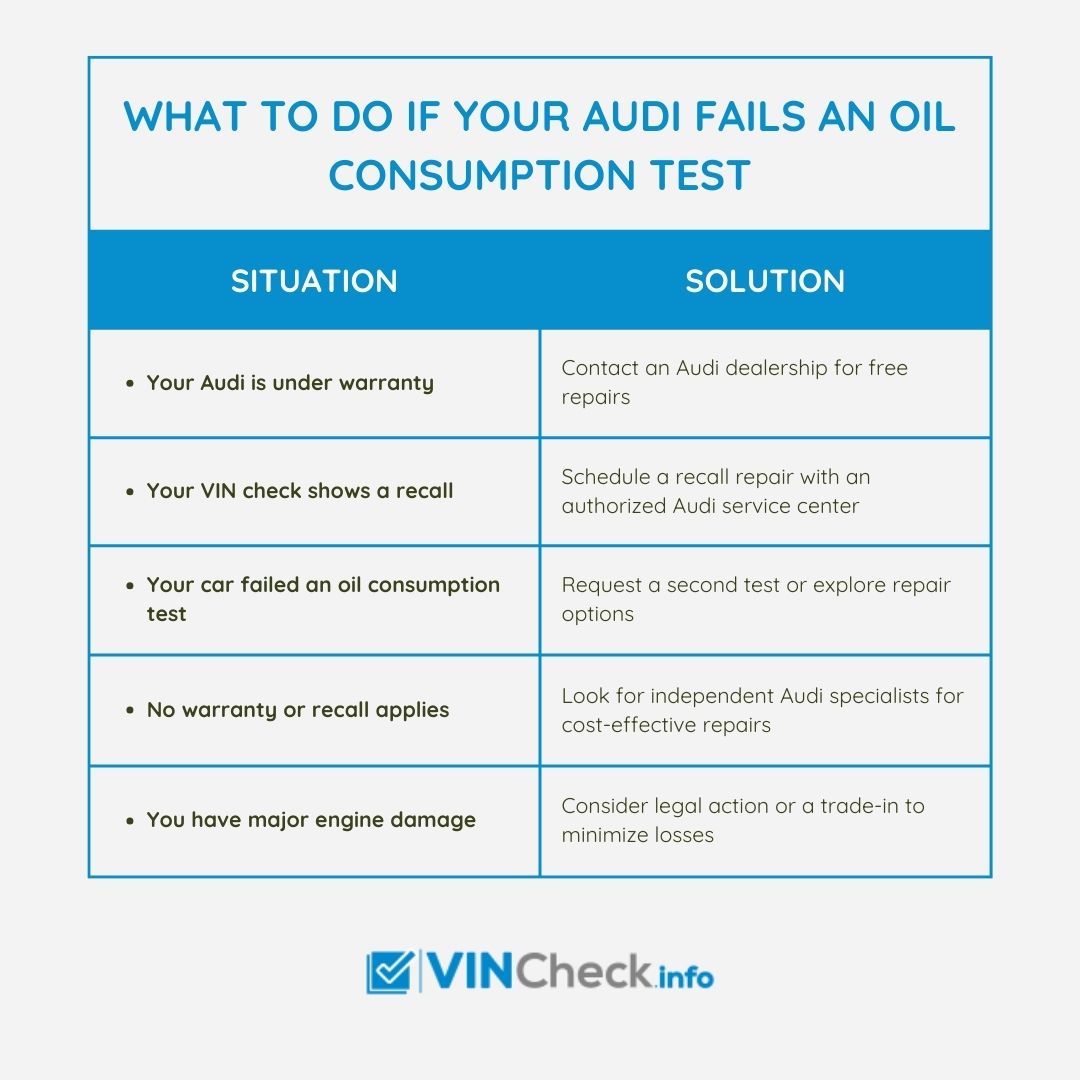Is your Audi burning more oil than it should? Some models suffer from excessive oil consumption, leading to costly repairs. Before buying a used Audi or dealing with oil loss in your current car, a VIN check can help. An Audi oil consumption VIN check reveals if your vehicle has known oil issues. It provides details on recalls, technical service bulletins (TSBs), and past repairs. This guide will show you how to use a VIN check to protect your car and your wallet.

Why Some Audis Burn Too Much Oil
Many Audi owners have reported excessive oil consumption. Certain models, especially those with 2.0T and 4.2L V8 engines, are more likely to have this problem. Design flaws in piston rings, engine seals, or the PCV system often cause oil burning.
Common signs include:
- Frequent low oil warnings
- Needing to add oil often between changes
- Rough idling or misfires
- More smoke from the exhaust
Ignoring these symptoms can lead to engine damage. Fortunately, a VIN check can help you find out if your Audi has a history of oil issues.
How an Audi Oil Consumption VIN Check Helps
A VIN (Vehicle Identification Number) check gives you a car’s history. It provides details about recalls, repairs, and manufacturer warnings. If you’re experiencing oil consumption problems, an Audi VIN check can confirm if your car has a known issue.
What Can a VIN Check Reveal?
1️⃣ Technical Service Bulletins (TSBs) – Audi issues TSBs to dealerships about known defects. These may include oil consumption tests or repair instructions.
2️⃣ Manufacturer Recalls – Some Audi models had recalls due to excessive oil burning. A VIN check can confirm if your vehicle is affected.
3️⃣ Repair and Maintenance History – The report may show past repairs related to oil consumption. This helps buyers avoid problem vehicles.
4️⃣ Warranty Extensions and Legal Claims – Some Audi owners received warranty extensions or lawsuit settlements. A VIN check can show if your car qualifies for coverage.
How to Check Your Audi’s VIN for Oil Issues
Running an Audi oil consumption VIN check is simple. Follow these steps:
1. Find Your VIN
The VIN is a 17-character code unique to each vehicle. You can find it:
- On the driver’s side dashboard (visible through the windshield)
- Inside the driver’s side door frame
- On your registration or insurance papers
2. Use a Trusted VIN Check Tool
You can check your VIN using:
- Audi’s Official VIN Lookup – Audi provides a VIN lookup tool for recalls and service programs.
- NHTSA Database – The National Highway Traffic Safety Administration (NHTSA) lets you search recalls by VIN.
- Third-Party VIN Check Services – Websites like Carfax and VINCheck.info provide reports on past repairs and TSBs.
3. Analyze the Report
Look for:
- Oil-related TSBs – These contain repair instructions for dealerships.
- Recalls for excessive oil consumption – Some Audi models qualify for free repairs.
- Service records – The report may show if a previous owner had oil consumption tests done.
What to Do If Your Audi Has an Oil Consumption Problem
If your VIN check confirms oil consumption issues, take action. Here’s what you can do:
1. Get an Oil Consumption Test
Audi dealerships often perform oil consumption tests to determine whether a vehicle qualifies for repairs. This involves measuring oil usage over a set mileage. If your car burns more oil than the factory-approved limit, you may be eligible for repairs or reimbursement.
2. Check for Warranty Coverage
Audi has offered extended warranties on some models with excessive oil consumption. If your car is eligible, Audi may cover the cost of repairs, including replacing piston rings or updating engine components.
3. Stay on Top of Oil Changes
If your vehicle is not covered under warranty, regular oil changes using the correct Audi-approved oil can help minimize excessive consumption and extend engine life.
4. Consider Repairs
If the oil loss is severe, repairs may be necessary. Common fixes include piston ring replacement, PCV valve repairs, and engine sealing updates. Audi specialists can handle these issues.
5. Explore Legal Options
If your Audi’s oil consumption issue has led to costly repairs, you may have legal options. Some owners have won class-action settlements or reimbursement through legal claims.

Final Thoughts
Excessive oil consumption is a common issue in certain Audi models. If you’re buying a used Audi or noticing oil loss in your car, don’t ignore it. A VIN check can confirm whether your vehicle has a known oil burning problem.
Checking for TSBs, recalls, and repair history with an Audi oil consumption VIN check can save you from unexpected expenses. Take control of your car’s maintenance and avoid costly surprises.
Need to check your Audi’s VIN? Run a VIN check today to uncover hidden oil issues and protect your investment!